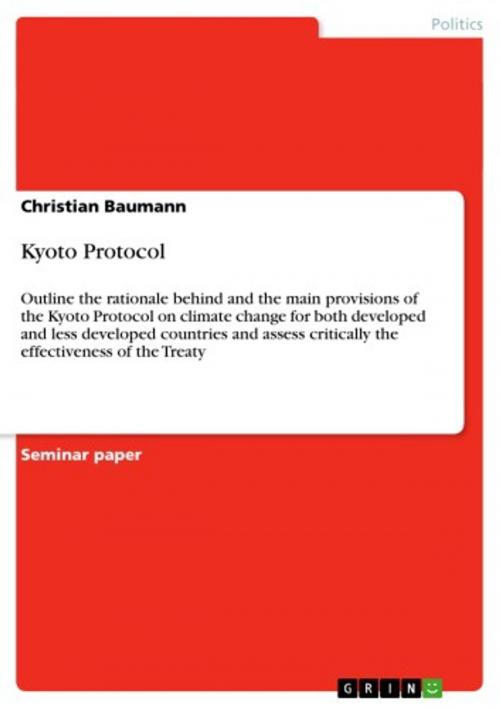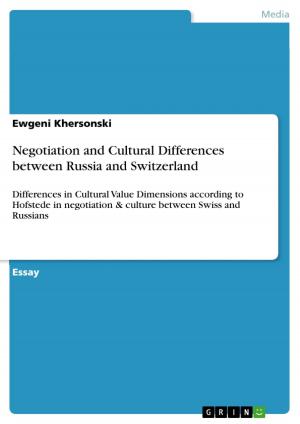Kyoto Protocol
Outline the rationale behind and the main provisions of the Kyoto Protocol on climate change for both developed and less developed countries and assess critically the effectiveness of the Treaty
Nonfiction, Science & Nature, Science, Biological Sciences, Environmental Science| Author: | Christian Baumann | ISBN: | 9783640417933 |
| Publisher: | GRIN Publishing | Publication: | September 3, 2009 |
| Imprint: | GRIN Publishing | Language: | English |
| Author: | Christian Baumann |
| ISBN: | 9783640417933 |
| Publisher: | GRIN Publishing |
| Publication: | September 3, 2009 |
| Imprint: | GRIN Publishing |
| Language: | English |
Seminar paper from the year 2009 in the subject Politics - International Politics - Environmental Policy, grade: 1,5, Grenoble Ecole de Management, course: Business Ethics, language: English, abstract: For many years scientists alert that a climatic change is taking place which is significantly caused by the way human beings are treating their environment. The negative effects of this development had their origin in the end of the 19th respectively in the beginning of the 20th century when the industrialization in many western countries began. With the industrial progress over the last 100 years an increasingly amount of greenhouse gases is released into the atmosphere causing the ecological balance to become incrementally out of order. The impact can be already felt today as temperatures are rising and this is likely to bring about changes for nature including the human beings and many other species. Although the global climatic change is unlikely to be stopped medium-term because carbon dioxide, the greenhouse gas with the largest quantity in the air, is said to have a 100 years+ lifetime span in atmosphere , the effects of the worldwide warming can be mitigated. In the early 1990's this environmental issue was picked up and first steps for global climate policies were made. In 1997, the diplomatic efforts led to the resolution of the so called Kyoto protocol which obligates the member states to reduce its greenhouse gas emissions. This result can still today be seen as a milestone in the international climate policy. Therefore, this agreement will be the subject of examination on the following pages. The author will firstly describe the rationale behind the protocol before underlining its main provisions for developed and less developed countries. Moreover, the effectiveness of the treaty will be critically evaluated and finally emphasize will be also given to the impact it has on my home country, Germany.
Seminar paper from the year 2009 in the subject Politics - International Politics - Environmental Policy, grade: 1,5, Grenoble Ecole de Management, course: Business Ethics, language: English, abstract: For many years scientists alert that a climatic change is taking place which is significantly caused by the way human beings are treating their environment. The negative effects of this development had their origin in the end of the 19th respectively in the beginning of the 20th century when the industrialization in many western countries began. With the industrial progress over the last 100 years an increasingly amount of greenhouse gases is released into the atmosphere causing the ecological balance to become incrementally out of order. The impact can be already felt today as temperatures are rising and this is likely to bring about changes for nature including the human beings and many other species. Although the global climatic change is unlikely to be stopped medium-term because carbon dioxide, the greenhouse gas with the largest quantity in the air, is said to have a 100 years+ lifetime span in atmosphere , the effects of the worldwide warming can be mitigated. In the early 1990's this environmental issue was picked up and first steps for global climate policies were made. In 1997, the diplomatic efforts led to the resolution of the so called Kyoto protocol which obligates the member states to reduce its greenhouse gas emissions. This result can still today be seen as a milestone in the international climate policy. Therefore, this agreement will be the subject of examination on the following pages. The author will firstly describe the rationale behind the protocol before underlining its main provisions for developed and less developed countries. Moreover, the effectiveness of the treaty will be critically evaluated and finally emphasize will be also given to the impact it has on my home country, Germany.















